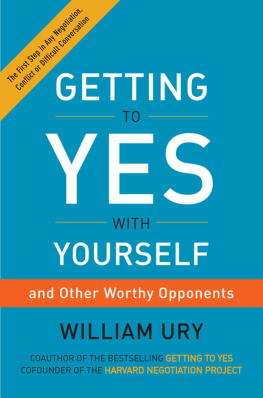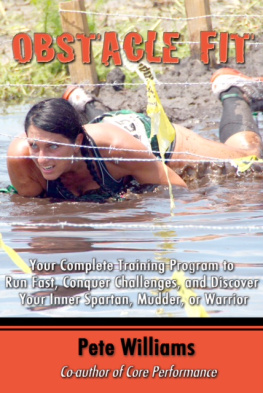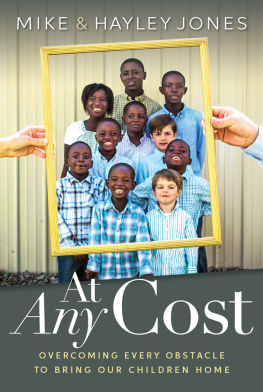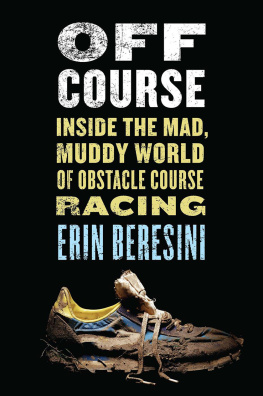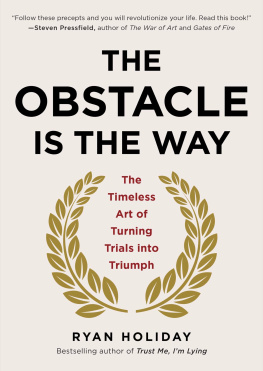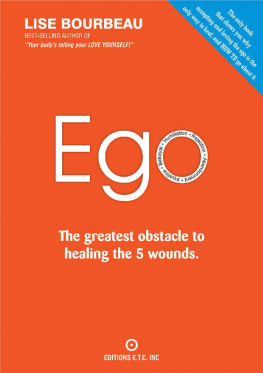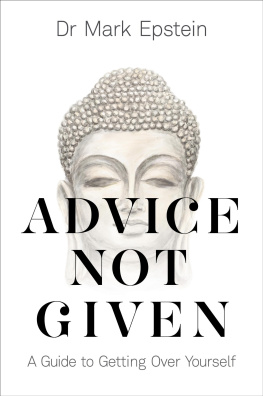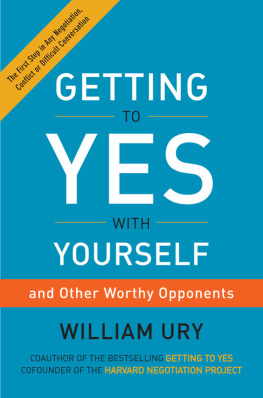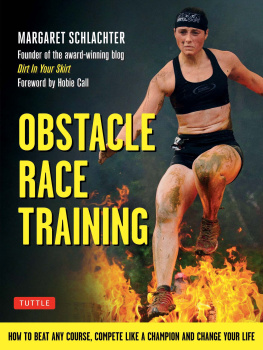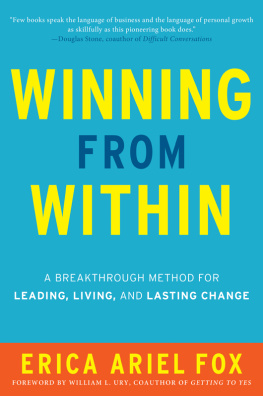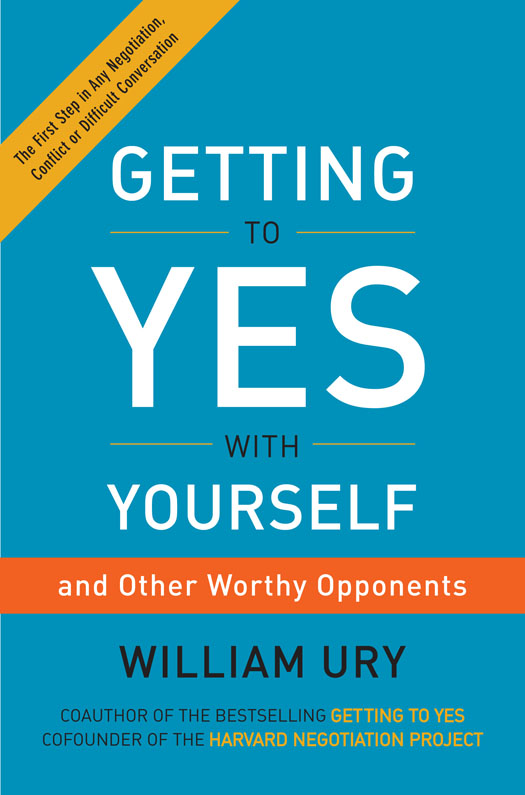To my teacherswith profound gratitude
CONTENTS

Let him who would move the world first move himself.
SOCRATES
How can we get to yes with others? How can we resolve the conflicts that naturally arise with colleagues and bosses, spouses and partners, clients and customers, children and family members, indeed almost everyone we interact with? How can we get what we really want and at the same time deal with the needs of others in our lives? Perhaps no human dilemma is more pervasive or challenging.
I have been working on this dilemma throughout my professional life. Three and a half decades ago I had the privilege of coauthoring with my late mentor and colleague Roger Fisher Getting to Yes: Negotiating Agreement Without Giving In. That book helped people change the way they negotiate with others at work, at home, and in the community. With millions of copies in circulation around the world, it helped transform the popular mindset for dealing with differences from win-lose thinking to a win-win or mutual gains approach.
Reaching mutually satisfying agreements can often be highly challenging, however. Since the publication of Getting to Yes, I have had the opportunity to train tens of thousands of people in all walks of life in the methods of mutual gains negotiation: managers, lawyers, factory workers, coal miners, schoolteachers, diplomats, peacekeepers, parliamentarians, and government officials. Many report success in changing the game from win-lose to win-win, but others struggle. Even if they have learned the basics of a win-win approach to negotiation, when placed in situations of conflict, they revert back to costly and destructive win-lose methods, usually attributing this reversion to the necessity of dealing with difficult people.
Because I have focused in my work on how to deal with difficult people and challenging situations, I thought I might be able to help further. So I wrote a follow-up book called Getting Past No and, in more recent years, another book called The Power of a Positive No. The methods described in these books have also helped many people to resolve their daily conflicts, but still I sensed something missing.
What was missing, I have come to realize, was the first and most important negotiation we ever conductthe negotiation with ourselves.
Getting to yes with yourself prepares the way for getting to yes with others. I have come to think of this book as the missing first half of Getting to Yes. It is the necessary prequel, but thirty years ago I did not fully realize just how necessary. If Getting to Yes is about changing the outer game of negotiation, Getting to Yes with Yourself is about changing the inner game so that we can then change the outer game. After all, how can we really expect to get to yes with others, particularly in challenging situations, if we havent first gotten to yes with ourselves?
OUR WORTHIEST OPPONENT
Whether we think of it or not, each of us negotiates every day. In the broad sense of the term, negotiation simply means the act of back-and-forth communication trying to reach agreement with others. Over the years, I have asked hundreds of audiences the question Who do you negotiate with in the course of your day? The answers I receive usually start with my spouse or partner and my children, continue on to my boss, my colleagues, and my clients, and finally to everyone in my life all the time. But, every so often, one person will answer: I negotiate with myself. And the audience inevitably laughswith the laughter of recognition.
The reason why we negotiate is, of course, not just to reach agreement but to get what we want. Gradually, over the decades of mediating in a variety of difficult conflicts, from family feuds and boardroom battles to labor strikes and civil wars, I have come to the conclusion that the greatest obstacle to getting what we really want in life is not the other party, as difficult as he or she can be. The biggest obstacle is actually ourselves. We get in our own way. As President Theodore Roosevelt once colorfully observed, If you could kick the person in the pants responsible for most of your trouble, you wouldnt sit for a month.
We sabotage ourselves by reacting in ways that do not serve our true interests. In a business dispute, one partner calls the other a liar in the press, shaming the other, who launches a lawsuit that is highly costly for both. In a sensitive divorce conversation, the husband loses his temper, lashes out at his wife, and storms out, undermining his own expressed interest in resolving the issue amicably for the sake of the family.
Underlying our poor reactions in moments of conflict is an adversarial win-lose mindset, the assumption that either we can get what we want or they canbut not both. Whether it is business titans struggling for control over a commercial empire or children fighting over a toy or ethnic groups quarreling over territory, the unspoken premise is that the only way one side can win is if the other loses. Even if we want to cooperate, we are afraid that the other person will take advantage of us. What sustains this win-lose mindset is a sense of scarcity, the fear that there is just not enough to go around, so we need to look out for ourselves even at the expense of others. All too often, the result of such win-lose thinking is that all sides lose.
But the biggest obstacle to our success can also become our biggest opportunity. If we can learn to influence ourselves first before we seek to influence others, we will be better able to satisfy our needs as well as to satisfy the needs of others. Instead of being our own worst opponents, we can become our own best allies. The process of turning ourselves from opponents into allies is what I call getting to yes with yourself.
SIX CHALLENGING STEPS
I have spent many years studying the process of getting to yes with yourself, drawing deeply on my personal and professional experiences as well as observing the experiences of others. I have tried to understand what blocks us from getting what we really want and what can help us satisfy our needs and get to yes with others. I have codified what I have learned into a method with six steps, each of which addresses a specific internal challenge.
The six steps may at times seem like common sense. But in my three and a half decades of working as a mediator, Ive learned that they are uncommon sensecommon sense that is uncommonly applied. You might be familiar with some or all of these steps individually, but my hope is to bring them together into an integrated method that will help you keep them in mind and apply them in a consistent and effective way.
In brief, the six steps are as follows:
1. Put Yourself in Your Shoes. The first step is to understand your worthiest opponent, yourself. It is all too common to fall into the trap of continually judging yourself. The challenge instead is to do the opposite and listen empathetically for underlying needs, just as you would with a valued partner or client.
2. Develop Your Inner BATNA. Almost all of us find it difficult not to blame others with whom we come into conflict. The challenge is to do the opposite and to take responsibility for your life and relationships. More specifically, it is to develop your inner BATNA (

